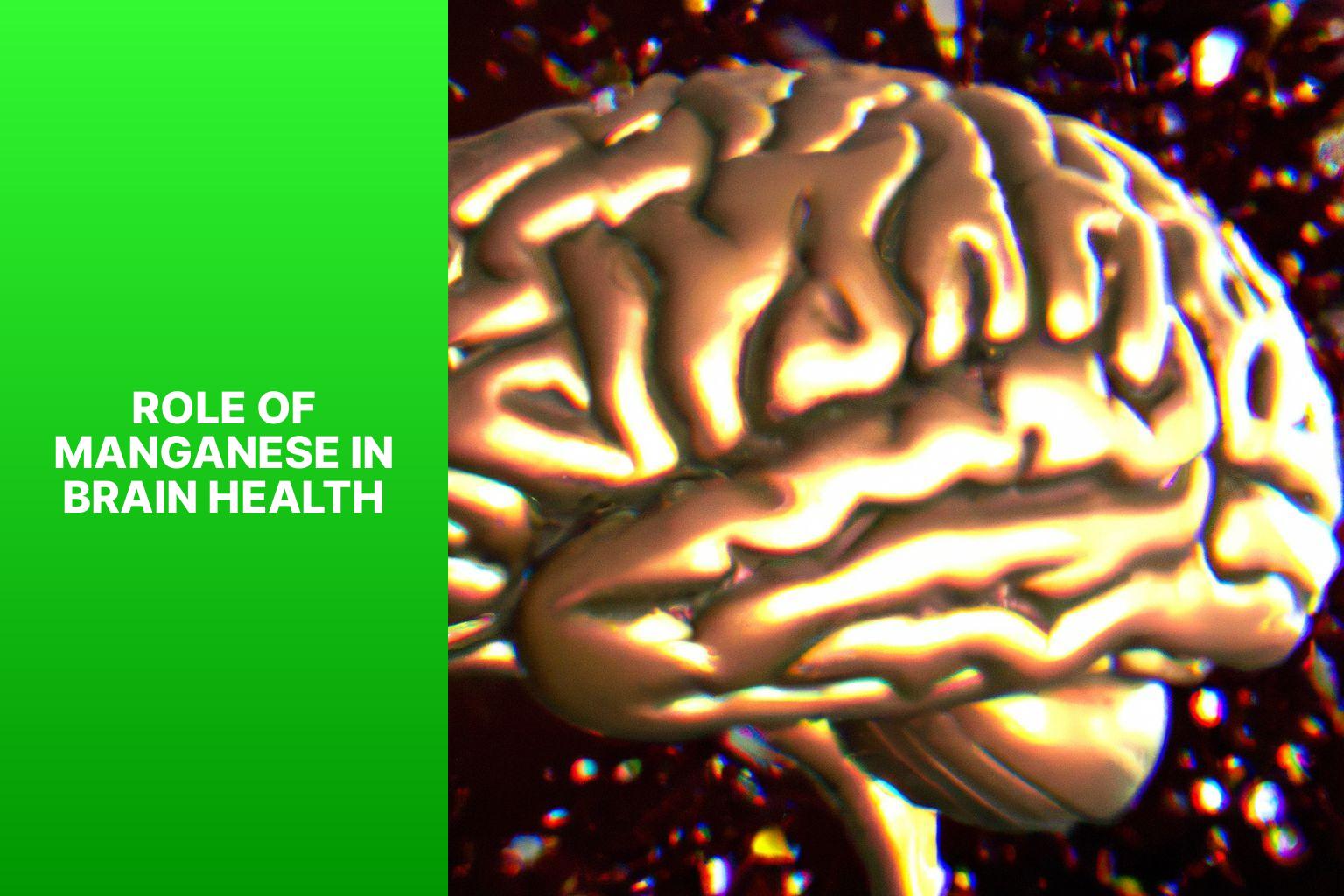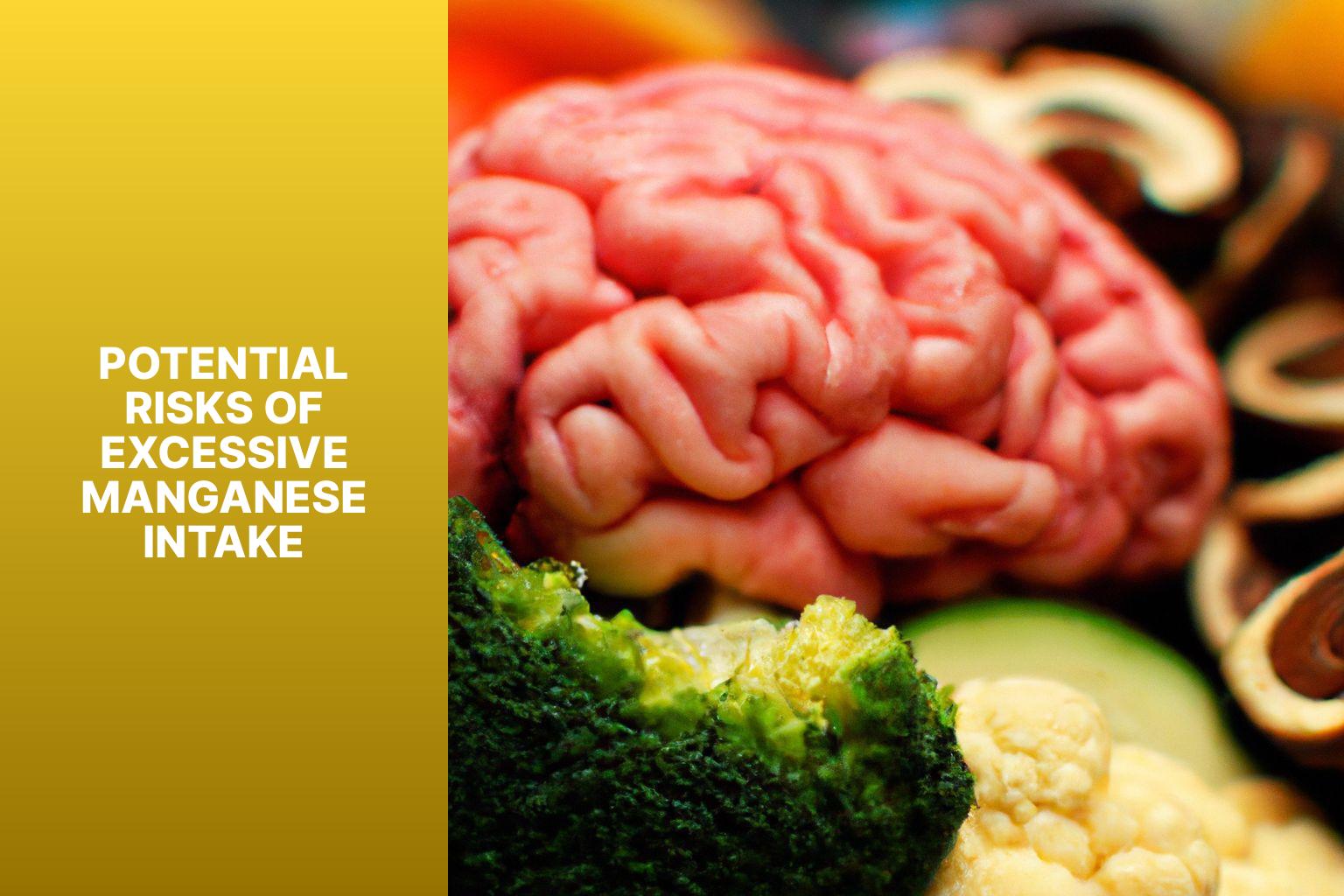The Impact of Manganese on Brain Health & Cognitive Function: Memory & Focus Support
Manganese, an essential mineral, plays a crucial role in supporting brain health and cognitive function. Brain health refers to the overall well-being and optimal functioning of the brain, while cognitive function encompasses various mental processes such as memory, focus, and attention. In this article, we will examine the significance of manganese in promoting brain health and how it influences cognitive functions.
Manganese supports brain health through its involvement in various biochemical processes. It acts as a cofactor for several enzymes that are essential for neurotransmitter synthesis, which are chemicals that facilitate communication between brain cells. Manganese plays a role in the production of antioxidants, which help protect the brain from oxidative stress and damage.
Furthermore, manganese has been linked to cognitive functions such as memory and focus. Adequate levels of manganese are necessary for the formation and maintenance of memory pathways in the brain. It also supports the proper functioning of neurotransmitters involved in attention and focus.
To ensure optimal manganese intake, it is important to include food sources rich in this mineral in your diet. Good dietary sources of manganese include nuts, whole grains, legumes, green leafy vegetables, and certain fruits. However, the recommended daily intake of manganese varies depending on age, sex, and health condition.
While manganese is essential for brain health, a deficiency in this mineral can have negative effects. Signs of manganese deficiency may include impaired cognitive function, memory problems, and mood disturbances. On the other hand, excessive manganese intake can also pose potential risks, leading to neurological symptoms and toxicity.
Understanding the role of manganese in brain health and how it influences cognitive functions is crucial for maintaining optimal brain and mental well-being. In the following sections, we will delve deeper into the specific cognitive functions that manganese supports, food sources rich in manganese, recommended daily intake, signs of deficiency, and potential risks associated with excessive manganese intake.
Key takeaway:
- Manganese supports brain health and cognitive function: Manganese plays a crucial role in supporting brain health and various cognitive functions such as memory and focus.
- Manganese optimizes brain function: Manganese supports brain health by influencing neurotransmitter production and protecting against oxidative stress, enhancing memory and cognitive function.
- Manganese-rich foods for brain health: Consuming foods rich in manganese, such as nuts, whole grains, and leafy green vegetables, can help maintain brain health and cognitive function.
What is Brain Health and Cognitive Function?
Brain health refers to the overall well-being and optimal functioning of the brain. It encompasses various aspects such as cognition, memory, attention, and overall mental well-being. Cognitive function, on the other hand, refers to the mental processes and abilities that allow us to perceive, think, reason, remember, and focus.
Role of Manganese in Brain Health

Photo Credits: Diabetescompass.Com by Edward Thomas
Manganese plays a crucial role in supporting brain health and various cognitive functions, including memory and focus. Here are the key roles and benefits of manganese in brain health:
- Antioxidant Activity: Manganese acts as a cofactor for the enzyme superoxide dismutase (SOD), which helps protect brain cells from oxidative stress and damage caused by free radicals. This antioxidant activity helps maintain the overall health of brain cells.
- Neurotransmitter Regulation: Manganese is involved in the synthesis and regulation of neurotransmitters, such as dopamine, serotonin, and norepinephrine. These neurotransmitters play essential roles in mood regulation, memory formation, and cognitive function.
- Mitochondrial Function: Manganese is required for the proper functioning of mitochondria, the powerhouse of cells. Mitochondria in brain cells need an adequate supply of manganese to generate energy efficiently, which is essential for optimal brain function.
- Neuronal Development and Plasticity: Manganese is involved in the development and plasticity of neurons, which are the building blocks of the brain. It supports processes such as neuronal growth, synapse formation, and synaptic plasticity, which are vital for learning, memory, and cognitive abilities.
- Neuroprotection: Manganese has been found to have neuroprotective properties, helping to safeguard brain cells from damage and degeneration. It may play a role in reducing the risk of neurodegenerative disorders such as Parkinson’s disease and Alzheimer’s disease.
- Myelin Formation: Manganese is involved in the synthesis of myelin, a protective sheath around nerve fibers that facilitates efficient signal transmission. Adequate manganese levels are necessary for the maintenance and repair of myelin, which is crucial for proper brain function.
Manganese plays a vital role in maintaining brain health and supporting cognitive functions. Ensuring an adequate intake of manganese through a balanced diet or supplementation can contribute to optimal brain function and may help support memory, focus, and overall cognitive abilities.
How Does Manganese Support Brain Health?
Manganese is a mineral that plays a crucial role in supporting brain health. It is essential for various cognitive functions such as memory and focus. Here are some ways in which manganese supports brain health:
1. Antioxidant activity: Manganese acts as a cofactor for the enzyme superoxide dismutase, which works as an antioxidant. This enzyme helps protect the brain cells from oxidative stress, which can lead to neurodegenerative diseases and cognitive decline.
2. Energy production: Manganese is involved in the metabolism of carbohydrates, proteins, and fats, which are the main sources of energy for the brain. By ensuring efficient energy production, manganese supports optimal brain function and enhances cognitive processes.
3. Neurotransmitter synthesis: Manganese is essential for the synthesis of neurotransmitters such as serotonin, dopamine, and norepinephrine. These neurotransmitters play a critical role in regulating mood, emotions, and cognitive functions like memory, attention, and learning.
4. Neuroprotection: Manganese contributes to the formation and maintenance of the myelin sheath, a protective layer around nerve cells. This sheath helps facilitate proper communication between brain cells and protects them from damage. Manganese supports the production of brain-derived neurotrophic factor (BDNF), a protein that promotes the growth and survival of brain cells.
5. Reducing inflammation: Chronic inflammation has been linked to various neurodegenerative disorders. Manganese possesses anti-inflammatory properties, which help reduce inflammation in the brain and protect against neurodegenerative diseases.
To ensure sufficient manganese intake for brain health, include food sources rich in manganese in your diet. Good sources include whole grains, nuts, seeds, legumes, leafy green vegetables, and tea.
It’s important to note that excessive manganese intake can be harmful to brain health. High levels of manganese have been associated with neurotoxic effects and impaired cognitive function. It is essential to follow the recommended daily intake of manganese, which is around 2.3 to 2.6 milligrams for adults.
Manganese supports brain health by functioning as an antioxidant, aiding in energy production, neurotransmitter synthesis, neuroprotection, and reducing inflammation. By including manganese-rich foods in your diet and maintaining the recommended intake, you can support your brain health and enhance cognitive functions like memory and focus.
So, next time you’re planning your meals, consider incorporating foods rich in manganese to support your brain health naturally.
Manganese and Cognitive Functions
Explore the fascinating link between manganese and cognitive functions as we dive into the world of brain health. Uncover how manganese can impact your memory, focus, and attention. With the support of scientific research and expert opinions, we’ll discover how this often overlooked mineral plays a vital role in keeping our minds sharp and our cognitive abilities at their best.
Memory
Memory is a crucial cognitive function that allows us to retain and recall information and experiences. It plays a vital role in our daily lives, from remembering simple tasks to recalling important events.
| – Involves the ability to encode, store, and retrieve information. | |
| Mnemonic devices: | – Techniques to improve memory, such as acronyms or visualization. |
| Working memory: | – Holds and manipulates information in the short term. |
| Long-term memory: | – Stores information for an extended period of time. |
| Episodic memory: | – Retains personal experiences and events. |
| Spatial memory: | – Involves the ability to recall locations and navigate. |
Maintaining optimal memory function is essential for efficient learning, productivity, and overall cognitive well-being. Several factors can influence memory, including lifestyle habits, nutrition, and brain health.
Your brain’s health is vital for supporting memory. Adequate intake of essential nutrients, including manganese, plays a role in maintaining optimal brain function.
Manganese is a trace mineral that serves as an important co-factor for various enzymatic reactions in the body, including those related to brain function. It is involved in the synthesis of neurotransmitters, such as serotonin and dopamine, which are essential for memory formation and recall.
In addition, manganese supports the production of antioxidants in the brain, which help protect against oxidative stress and neurodegenerative diseases that can negatively impact memory. It also contributes to the formation of myelin, a protective covering around nerve fibers that facilitates efficient communication between brain cells.
A balanced diet rich in manganese can support memory function. Good food sources of manganese include nuts, whole grains, legumes, leafy green vegetables, and fruits.
While manganese is essential for brain health and memory function, it is important to note that excessive intake of manganese can have negative effects. High levels of manganese have been associated with neurological disorders and cognitive impairments.
Therefore, it is recommended to obtain manganese from natural food sources rather than relying on supplements. It is also important to consult with a healthcare professional to ensure you are meeting your individual nutrient needs.
Memory is a significant aspect of cognitive function, and maintaining optimal brain health is crucial for supporting memory. Manganese, as a trace mineral, plays a role in various brain processes that contribute to memory formation and recall. By incorporating manganese-rich foods into your diet, you can support memory function and overall cognitive well-being.
Fun Fact: Did you know that sleep plays a crucial role in memory consolidation? Getting adequate sleep can enhance memory retention and recall.
Focus and Attention
Maintaining focus and attention is crucial for cognitive function and productivity. Here are some important factors to consider when exploring the topic of focus and attention:
– Brain health: Focus and attention are cognitive functions that play a significant role in our daily lives. A healthy brain is essential for optimal performance in tasks that require sustained attention and concentration.
– Role of manganese: Manganese is a trace mineral that plays a role in brain health and cognitive function. It is involved in the synthesis of neurotransmitters, which are chemicals responsible for transmitting signals between brain cells.
– How manganese supports focus and attention: Manganese helps regulate the release of dopamine, a neurotransmitter associated with attention and focus. Adequate levels of manganese in the brain can support optimal dopamine function, enhancing focus and attention span.
– Food sources of manganese: Manganese can be obtained from various dietary sources, including nuts, seeds, whole grains, legumes, and leafy green vegetables. Incorporating these foods into your diet can help maintain adequate manganese levels for optimal brain function.
– Recommended daily intake of manganese: The recommended daily intake of manganese varies depending on age and gender. For adults, the recommended intake ranges from 1.8 to 2.3 milligrams per day. It’s important to ensure you are meeting your daily manganese requirements through a balanced diet to support focus and attention.
– Signs of manganese deficiency: A deficiency in manganese can lead to cognitive impairments, including difficulties with focus and attention. Symptoms may include poor concentration, decreased alertness, and reduced cognitive performance. If you experience these symptoms, it’s important to consult a healthcare professional for diagnosis and guidance.
– Potential risks of excessive manganese intake: While manganese is essential for brain health, excessive intake can have negative effects. High levels of manganese have been associated with neurotoxicity and cognitive impairments. It’s important to maintain a balanced intake of manganese and avoid excessive supplementation.
Pro-tip: Along with maintaining a balanced diet rich in manganese, incorporating other brain-boosting activities such as regular exercise, quality sleep, and engaging in mental stimulation can further enhance focus and attention. Prioritizing healthy habits can support overall cognitive function and well-being.
By considering these factors, you can cultivate better focus and attention by ensuring optimal manganese levels, maintaining a healthy lifestyle, and seeking professional guidance when needed.
Food Sources of Manganese
Include these food sources in your diet to ensure an adequate intake of manganese:
- Nuts and Seeds: Almonds, walnuts, pecans, pumpkin seeds, and flaxseeds are all rich in manganese.
- Whole Grains: Whole wheat, brown rice, oats, and quinoa are excellent sources of manganese.
- Legumes: Beans, lentils, chickpeas, and soybeans provide a good amount of manganese.
- Leafy Green Vegetables: Spinach, kale, collard greens, and Swiss chard are among the greens that contain manganese.
- Tea: Green tea and black tea are natural sources of manganese.
- Fruits: Pineapple, blueberries, raspberries, and strawberries are some fruits that provide manganese.
- Seafood: Mussels, clams, and other shellfish are seafood options that contain manganese.
- Herbs and Spices: Cloves, ginger, cinnamon, turmeric, and saffron are spices and herbs that contribute to manganese intake.
- Chocolate: Dark chocolate is not only delicious but also contains manganese.
Incorporating these food sources into your diet can help ensure you are getting sufficient manganese to support brain health and cognitive function.
Recommended Daily Intake of Manganese
The recommended daily intake of manganese varies based on age, sex, and life stage. The following are the recommended dietary allowances (RDAs) for manganese:
- Infants (0-6 months): 3 micrograms
- Infants (7-12 months): 600 micrograms
- Children (1-3 years): 1.2 milligrams
- Children (4-8 years): 1.5 milligrams
- Children (9-13 years): 1.9 milligrams for males, 1.6 milligrams for females
- Adolescents (14-18 years): 2.2 milligrams for males, 1.6 milligrams for females
- Adults (19 years and older): 2.3 milligrams for males, 1.8 milligrams for females
- Pregnant women: 2 milligrams
- Lactating women: 2.6 milligrams
It’s important to note that these recommendations are based on maintaining general health and preventing deficiency. Individuals with specific health conditions or those following certain dietary patterns may have different manganese needs and should consult with a healthcare professional.
Signs of Manganese Deficiency
Signs of manganese deficiency may manifest in various ways, indicating the importance of manganese for brain health and cognitive function. Look out for the following signs:
- Impaired Memory: Manganese deficiency has been linked to memory problems. If you experience difficulty remembering things or have a decline in your ability to retain information, it could be a sign of manganese deficiency.
- Difficulty Focusing: Manganese plays a role in maintaining focus and attention. If you find it challenging to concentrate on tasks or have a decreased ability to stay focused, it could be due to a lack of manganese.
- Brain Fog: Manganese deficiency might contribute to brain fog, which is characterized by a feeling of mental confusion, lack of clarity, and difficulty with cognitive tasks.
- Reduced Learning Ability: Manganese is involved in various processes related to learning and cognitive function. A deficiency in manganese may impair your ability to learn new information and acquire new skills.
- Mood Changes: Manganese deficiency has been associated with changes in mood, including irritability, anxiety, and even depression. If you notice significant shifts in your mood without an apparent cause, it could be related to low manganese levels.
- Slowed Cognitive Processing: Manganese deficiency may lead to slower cognitive processing, making it harder to think quickly, process information, or solve problems efficiently.
- Weakness and Fatigue: In some cases, manganese deficiency can cause weakness and fatigue, which can indirectly impact cognitive function by reducing overall energy levels and mental alertness.
If you experience any of these signs or suspect a manganese deficiency, it is essential to consult with a healthcare professional for proper diagnosis and guidance on addressing potential deficiencies.
Potential Risks of Excessive Manganese Intake

Photo Credits: Diabetescompass.Com by Scott Rivera
While manganese is essential for brain health and cognitive function, it’s important to be aware of the potential risks associated with excessive manganese intake:
- Neurotoxicity: High levels of manganese in the brain can lead to neurotoxicity, causing symptoms such as tremors, muscle stiffness, and cognitive impairments.
- Manganese-induced Parkinsonism: Prolonged exposure to excessive manganese can increase the risk of developing Parkinson’s-like symptoms, including movement difficulties and tremors.
- Impaired cognitive function: Paradoxically, while manganese is necessary for cognitive function, excessive levels can have the opposite effect. It can lead to cognitive decline, memory problems, and difficulty focusing.
- Behavioral changes: Excessive manganese intake has been linked to behavioral changes, including irritability, mood swings, and even psychiatric disorders.
- Impaired motor function: In addition to affecting cognitive function, excessive manganese can impair motor skills and coordination, leading to difficulties in movement and balance.
- Interaction with other nutrients: Excessive manganese intake can interfere with the absorption and utilization of other essential nutrients, such as iron and calcium.
- Children and infants: Children and infants are particularly susceptible to the harmful effects of excessive manganese intake. It can interfere with their neurodevelopment and lead to long-term cognitive and behavioral problems.
- Occupational exposure: Certain occupations, such as welding or mining, may involve higher levels of manganese exposure. Workers in these industries should take precautions to minimize their risk of excessive manganese intake.
- Pre-existing conditions: Individuals with liver or kidney diseases may have difficulty metabolizing and excreting excess manganese, putting them at higher risk of manganese toxicity.
- Medication interactions: Some medications, such as antipsychotics and certain antibiotics, can interact with manganese and increase the risk of toxicity. It’s important to consult with a healthcare professional if you’re taking any medications.
It’s important to maintain a balanced and moderate intake of manganese through a healthy diet or supplementation, as excessive intake can have negative consequences on brain health and cognitive function. Consulting with a healthcare professional is recommended to ensure optimal manganese intake and minimize the risks associated with excessive intake.
Manganese for Brain Health and Cognitive Function:
- ✅ Manganese is an essential micronutrient that plays a crucial role in supporting brain health and cognitive functions. (Source: Journal of Biological Chemistry)
- ✅ Changes in manganese levels in the body have been associated with altered neuronal physiology and cognition in humans. (Source: Journal of Biological Chemistry)
- ✅ Manganese is involved in the metabolism of proteins, lipids, and carbohydrates, which are vital for brain function. (Source: Journal of Biological Chemistry)
- ✅ Both excessive and insufficient levels of manganese can lead to neurological dysfunction, affecting memory and focus. (Source: Journal of Biological Chemistry)
- ✅ Mn homeostasis and proper balance of manganese in the body are important for maintaining optimal brain health and cognitive function. (Source: Journal of Biological Chemistry)
Frequently Asked Questions
How does manganese support brain health and cognitive functions such as memory and focus?
Manganese plays a crucial role in brain health and cognitive functions. It is involved in the metabolism of proteins, lipids, and carbohydrates, and acts as a cofactor for numerous enzymes. These enzymes are essential for proper brain function, including memory and focus. Furthermore, manganese is required for the normal development of the brain and its organs. However, the specific mechanisms through which manganese supports brain health and cognitive functions are not yet fully understood.
What are the dietary sources of manganese that contribute to brain health?
Manganese can be obtained through various dietary sources. These include whole grains, nuts, seeds, legumes, and leafy green vegetables. Incorporating these foods into your diet can provide an adequate amount of manganese that supports brain health and cognitive functions.
Can an imbalance in manganese levels affect brain health and cognition?
Both overexposure to and insufficient levels of manganese can cause neurological dysfunction and adversely affect brain health and cognition. Changes in manganese levels in the body are associated with altered neuronal physiology and cognition in humans. Therefore, maintaining optimal levels of manganese is crucial for brain health and cognitive functions.
What are the potential risks of excessive manganese exposure on brain health and cognitive functions?
Excessive manganese exposure, particularly through occupational or environmental sources, can lead to neurotoxicity and cause symptoms similar to Parkinson’s disease. These symptoms may include impaired cognitive function, memory loss, and decreased focus. Therefore, it is important to minimize exposure to excessive manganese to protect brain health and cognitive functions.
Are there any ongoing studies or research on the role of manganese in brain health?
Yes, there is ongoing research on the role of manganese in brain health and cognitive functions. Researchers are studying the molecular and biochemical mechanisms underlying manganese homeostasis, as well as its neurotoxicity. Additionally, the effects of manganese on cognitive function and behavior, particularly in children exposed to high levels of manganese in drinking water, are being investigated.
Is manganese supplementation beneficial for brain health and cognitive functions?
While manganese is an essential mineral, supplementation should only be considered under the guidance of a healthcare professional. Manganese supplements, such as manganese ascorbate, have been studied for their potential benefits in conditions such as osteoarthritis. However, it is important to maintain a balanced and varied diet that includes natural dietary sources of manganese to support overall brain health and cognitive functions.







